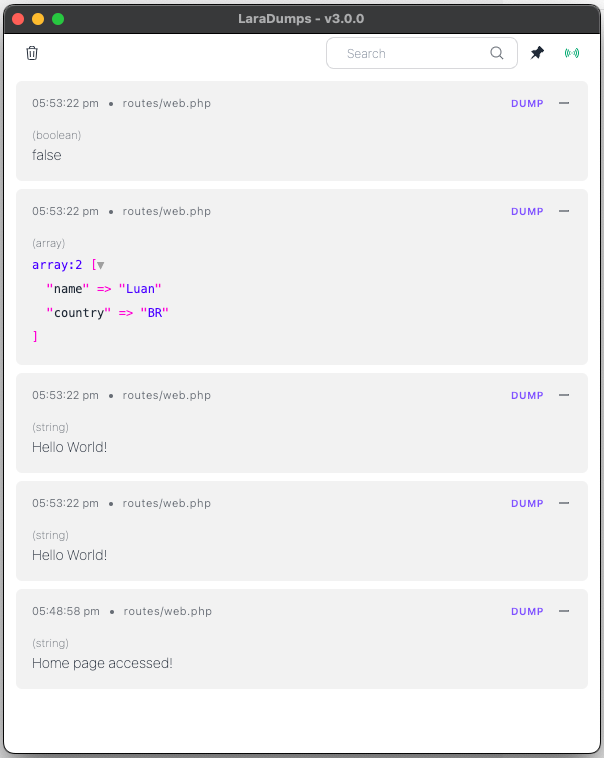PHP Tools
Introduction
LaraDumps provides you with a set of tools to debug your code and inspect what is happening to your application during the development process.
The LaraDumps core tools are framework agnostic and should be compatible with any PHP project.
In addition to PHP tools, LaraDumps also provides specific tools for debugging Laravel and Livewire projects, and it continues to accompany you while testing your software with Pest PHP.
Dump
To send a dump to the application, just pass one or more values to the ds() function.
$myString = 'Hello World!';
$myArray = ['name' => 'Luan', 'country' => 'BR'];
$myBoolean = false;
//Single value
ds($myString);
//Multiple values
ds($myString, $myArray, $myBoolean);This function is similar to PHP var_dump() or Laravel's dump() and it will not stop the code execution.

Dump and die
Use the function ds()->die() or its shortcut dsd() to dump and immediately stop the code execution.
$myString = 'Hello World!';
ds($myString)->die(); // or dsd($myString);
ds('This code will never be executed!');This function is similar to PHP var_dump(); die;or Laravel's dd().
Quiet dump
By default, LaraDumps Desktop App will be invoked and gain focus whenever a new dump is received.
If this is not what you want, simply disable the Auto-Invoke feature.
Alternatively, just use the dsq() method and send a quiet dump. This will not invoke the App.
// Requires Auto-Invoke to be enabled
$products = [['id' => 1, 'price' => 10], ['id' => 2, 'price' => 50], ['id' => 3, 'price' => -5]];
foreach ($products as $product) {
dsq('Checking product #' . $product['id']); //Send a dump without invoking the app
if ($product['price'] < 0) {
ds('Price error in product #' . $product['id']); //App will be invoked
}
}The previous example will quietly dump each product prices and only invoke in case the price is invalid.
Label
You can use the label() method to set a label to your debug dump.
Assigning a label makes it easier to locate the debug dump among other similar results.
$person = ['name' => 'Luan', 'country' => 'BR'];
$person2 = ['name' => 'Taylor', 'country' => 'US'];
ds($person)->label('Creator of LaraDumps');
ds($person2)->label('Creator of Laravel');Screens
You can use the toScreen() or s() methods to send your debug dump to a specific Screen.
By opening different screens, you can better organize your dumps into groups of similar issues.
ds('this is screen 1'); //default screen
ds('this is screen 2')->toScreen('screen 2');
ds('custom value')->s('Custom screen');Clear Screens
You can use the clear() method to delete all previous dumps from all screens.
This will reset your application to the start point.
ds()->clear();TIP
📝 Note: To clear only the current screen, click on the × at the right end of the screen list.
Color Tag
You can use the color() method to mark a dump with a predefined color.
ds('Info: Just FYI')->info(); // or ->blue()
ds('Success: IT WORKS!')->success(); // or ->green()
ds('Danger: ERROR!!!')->danger(); // or ->red()
ds('Warning: Something is not right!')->warning(); // or ->orange()
ds('Dark: The Dark Side of the Moon')->dark(); // or ->black()Time
To simply measure the execution time of a block of code, place it within the time($reference) and stopTime($reference) methods.
You must pass the same unique $reference title to both methods. The reference can be any combination of words.
ds()->time('my count');
for($i=0; $i<100000; $i++){
//some code
}
ds()->stopTime('my count');Table
You can use the table() method to display dumps in a table with a built-in search bar.
To build a table, you must pass an iterable $data as the first argument, followed by an optional string $name for the table name.
$allUsers = [
['id' => 1, 'name' => 'David', 'email' => 'david@example.com'],
['id' => 2, 'name' => 'Julia', 'email' => 'julia@example.com'],
//...
];
ds()->table($allUsers, 'my users table');JSON
Use the isJson() method to validate and display JSON strings in human-readable format.
This is very helpful for checking JSON content sent from an API or front-end app.
use Illuminate\Support\Facades\Http;
//Fetch Json data from the API
$moviesJson = Http::get('https://api.tvmaze.com/search/people?q=lauren')->body();
//✅ Valid JSON string
ds($moviesJson)->isJson();
//❌ Invalid JSON string
ds('{"name: Luan}')->isJson();Contains
You can use the contains() method to verify if a given string appears in the dump.
This is particularly useful when working with longer strings that require a lot of time to inspect and debug.
$html = '<select name="select-choice" id="select-choice"><option value="Choice 1">Choice 1</option><option value="Choice 2">Choice 2</option><option value="Choice 3">Choice 3</option></select>';
ds($html)->contains('Choice 3')->label('It should contain');
ds($html)->contains('Choice 29')->label('Should not contain');For a stricter search, you can activate Case Sensitive or Whole word parameters:
$json = '{"name":"Mariana", "country":"Brazil"}';
//Will not match "Brazil"
ds($json)->contains('brazil', caseSensitive: true);
//No match for "Maria" in "Mariana"
ds($json)->contains('Maria', wholeWord: true);PHPInfo
Displays the current PHP settings in table format.
ds()->phpinfo();Benchmark
Benchmark closures (array of closures or a variable number of closures as arguments) and dump detailed results including start time, end time, total execution time, and result for each closure and also includes a fastest flag to indicate the fastest closure in the results.
ds()->benchmark(
function() {
sleep(2);
return 'First';
},
function(){
sleep(1);
return 'Second';
}
);You can also add custom labels for each closures:
ds()->benchmark([
'Label 1' => function() {
sleep(1);
return 'Result 1';
},
'Label 2' => function() {
sleep(2);
return 'Result 2';
},
]);You can also chain multiple benchmarks or other tools:
ds()->benchmark(
...
)->benchmark(
...
)->table(..., ...);